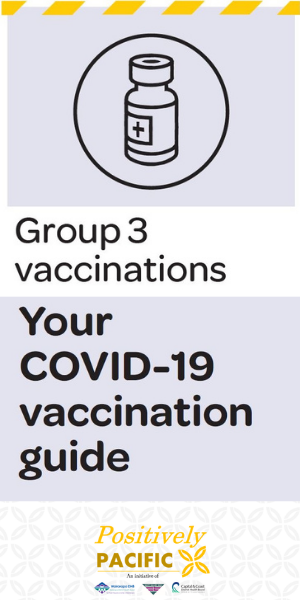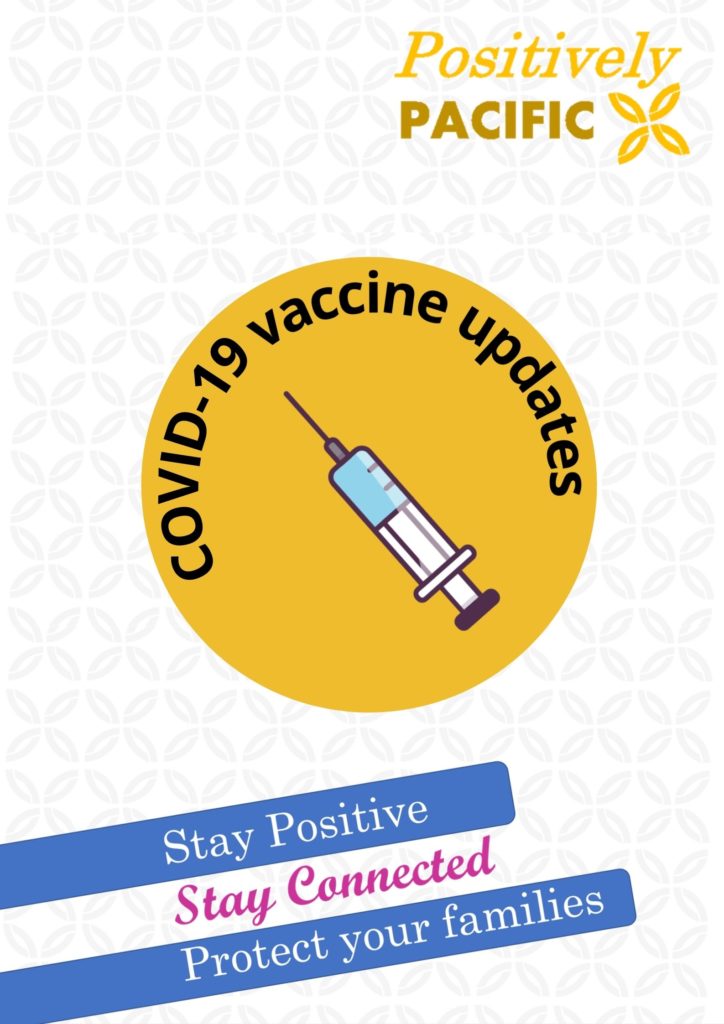

Across the greater Wellington region, there are 200,000 people in Group 3 for COVID-19 vaccination.
It will take some time to book them all in for their appointment – however our Health providers and GPs will be in touch with everyone by the end of July.
For people in Group 3, they don’t need to do anything. When it is their turn to book, they will be invited.
For most people, this will be through their GP, but there will be ways for others to book in as well.
Visit www.
The COVID-19 Vaccination Guide has been produced and is available for everyone who gets vaccinated. The guide has all the information needed for getting a COVID-19 vaccination, including about the vaccine, the rollout plan, information on before, during and after getting the COVID-19 vaccination, COVID-19 health reminders and how you can be vaccination proud using the vaccination banners.
The guide is available in 11 languages. Here are six Pacific languages. We will be adding additional languages and accessible formats in the near future.
COVID-19 Vaccination Guide – English
COVID-19 Vaccination Guide – Samoan
COVID-19 Vaccination Guide – Cook Islands Māori
COVID-19 Vaccination Guide – Niuean
COVID-19 Vaccination Guide – Tokelauan
COVID-19 Vaccination Guide – Fijian

COVID-19 vaccines are free and available to everyone in New Zealand.
Vaccines protect your health and prevent disease by working with your body’s natural defences so you are ready to fight the virus, if you are exposed.
The COVID-19 vaccine works by triggering your immune system to produce antibodies and blood cells that work against the COVID-19 virus.
Getting a COVID-19 vaccine is an important step you can take to protect yourself from the effects of the virus. However, we don’t yet know if it will stop you from catching and passing on the virus.
Once you’ve been vaccinated, continue to take precautions to prevent the spread of COVID-19.
Thoroughly wash and dry your hands. Cough or sneeze into your elbow and stay home if you feel unwell. This will help you protect yourself, your whānau and others.
Continue using the COVID tracer app, turn on your phone’s Bluetooth function, and you may wish to wear a face covering or mask.
More information in the Samoan, Cook Island, Fijian and English languages, click on the links at the bottom of this page.
Like all medicines, the vaccine may cause side effects in some people. This is the body’s normal response and shows the vaccine is working. Side effects are usually mild, don’t last long and won’t stop you from having the second dose or going about your daily life.
What can help:
When this could start:
What you will feel:
What can help:
When this could start:
Who is included in the initial vaccine roll-out?
The initial roll-out is for all border and MIQ workers covered by the current Required Testing Order (2020) and those they live with – ‘household contacts’. This applies to all workers currently undergoing mandatory COVID-19 testing as part of their work. These workers are considered to be the people most at risk of exposure to COVID-19 on a daily basis so we need to protect them and those they live with as a priority.
When will I find out more about the details of getting vaccinated?
Detailed information on vaccination locations, when you are likely to get your vaccination and how to arrange your vaccination will be finalised soon and we will let you know.
Once vaccinated, will I still need to be tested?
Yes. The data is clear that the vaccines protect individuals from the effects of the virus, however it is still too early for researchers to determine whether a vaccinated person could still transmit the virus to someone else. While this remains unclear, we need to assume there is still a risk of transmission. This means the mandatory testing of our border and MIQ workforce needs to continue.
Do I need to be vigilant about hygiene after I’m vaccinated?
It is also an important reminder that the vaccines are not a substitute for good hygiene practices of washing hands, coughing and sneezing into your elbow, wearing masks or face coverings and other precautions, including PPE.
Does the vaccine prevent me from transmitting the virus to others?
We don’t know at this stage. We do know that being vaccinated does not remove the need for PPE, regular testing and continuing with other precautions.
Who is a ‘household contact’?
This means anyone who usually lives with you, whether they’re related to you or not. It also includes people who live with you part-time. This covers papakāinga as well.
When will my household contacts get vaccinated?
Household contacts will be vaccinated as part of the initial roll-out, after border and MIQ workers have had their first dose.
How will my household contacts be contacted to arrange their vaccination?
It is important we get this process right. We are close to finalising how we will contact your household contacts to ensure they get the information they’ll need to arrange their vaccinations. We will let you know as soon as we can.